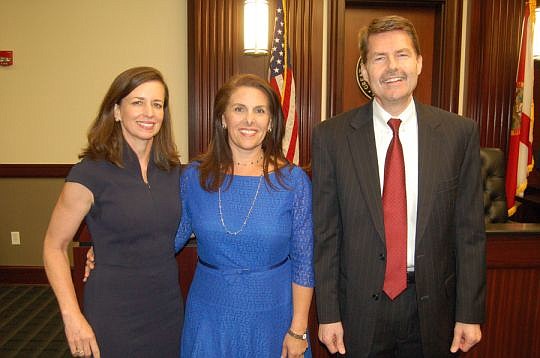
On the whole, attorneys present themselves in court with an appropriate degree of civility and professional conduct — but every once in a while, a judge has to reign in a lawyer — and technology can be a contributor to incivility among attorneys.
Those were the themes of the “Got Civility?” ethics CLE presented Wednesday at the Duval County Courthouse.
U.S. Magistrate Judge Patricia Barksdale led a panel that also included 1st District Court of Appeal Judge Harvey Jay III, Circuit Judge Tatiana Salvador and attorneys Hank Coxe, Lynn Drysdale and Braxton Gillam.
While the jurists agreed that uncivil attorneys are the exception, they offered insight as to how they respond when a lawyer crosses the line.
Barksdale said she’s reluctant to address such an issue in the courtroom or in writing. She also likes to know what may be behind an attorney’s questionable behavior.
“I like to give an attorney the benefit of the doubt” and “attorneys expect judges to make decisions based on both sides of the story,” Barksdale said.
“I’m always reticent to call anyone out in front of a jury or their client,” Jay said.
He also said poor manners don’t put an attorney in good standing with anyone in the courtroom.
“Bad behavior doesn’t pay with judges or juries,” Jay said.
Salvador said she begins subtly when correcting an attorney’s deportment.
“But if it continues or gets worse, I’ll step it up,” and would advise an attorney, “If you do that again, I’ll scold you in front of the jury,” she said, “But I haven’t yet had to do that.”
While the judges addressed issues of courtroom behavior, the attorneys said communication between adversarial lawyers can lead to uncivil actions.
Drysdale sometimes sees questionable behavior in emails.
“The conversation devolves. It gets nastier and nastier,” she said.
“Emails are the bane of civility,” Gillam said. “I almost wish we’d do away with email.”
Salvador said even popular media can contribute to unprofessional behavior in the courtroom.
“Sometimes attorneys are uncivil in the presence of their client because they think that’s what their client expects because it’s what they’ve seen on TV,” she said. “It’s up to the judge to ratchet it down.”
As an example of judicial guidance, Coxe related an incident when he was involved in a trial presided over by Circuit Judge Major Harding years before Harding became chief justice of the state Supreme Court.
An attorney from California appearing in the case advised the jury to “ignore anything the judge says,” Coxe said.
Soon after, upon reflection, the judge directed the visiting attorney to “spend an hour with Hank Coxe so you can learn how to behave in court.”
The CLE was presented by The Florida Bar Business Section in conjunction with The Jacksonville Bar Association, Jacksonville chapter of the Federal Bar Association and the Jacksonville Bankruptcy Bar Association.
(904) 356-2466